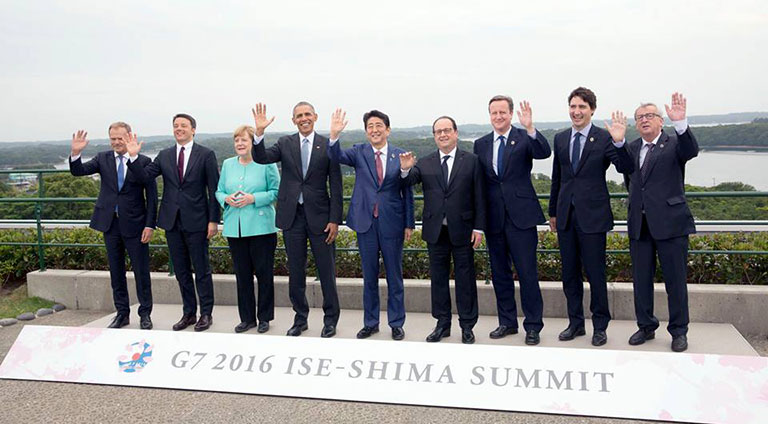g7_leaders_at_summit_in_shima_japan_5.26.16-cthe-white-house.jpg

Leaders at the G7 Summit 2016. Credit: ©The White House.
Leaders said they would be making use of “all policy tools” available to strengthen global demand, address supply constraints and put bring debt to sustainable levels.
“Global growth remains moderate and below potential, while risks of weak growth persist,” the leaders of the UK, Germany, Japan, Italy, the US, Canada and France said in a 32-page declaration.
“Global growth is our urgent priority.”
They said they would work towards a cooperative and balanced “three-pronged approach” that incorporates mutually-reinforcing fiscal, monetary and structural measures to achieve strong, sustainable and balanced growth – a strategy that has been recommended by both the International Monetary Fund and OECD.
This will take into account country-specific considerations, but on the fiscal side will encompass growth-friendly tax policy and public spending, including prioritising expenditure on high quality investments.
German chancellor Angela Merkel has in the past voiced scepticism about using public spending to boost growth, but Japanese prime minister Shinzo Abe, the IMF and others have supported this method.
Budgets will work to support productivity, employment, inclusiveness and growth while both fiscal and structural policies will buttress sustainable social security services to address the challenges of ageing societies, they said.
Investments will focus on quality infrastructure to tackle a global shortfall, as well as other areas conducive to economic growth including energy, education, science and technology.
Leaders also reaffirmed commitments to the implementation of global initiatives and standards to tackle tax avoidance and increase transparency and called on others to do the same.
Before the summit, Japan’s finance minister Taro Aso had said the meeting should mark a milestone in the fight against tax evasion. However afterwards, critics argued the meeting represented a missed opportunity.
Likewise, leaders paid lip service to their continuing support for international anti-corruption schemes and said they will work to “move the global anti-corruption agenda forward”, but refrained from any new commitments.
The wide-ranging statement also touched on the economic dangers of Brexit, and condemned the actions of North Korea, China in the South China Sea and the annexation of Crimea, extending a sanctions regime against Russia.
Leaders made a raft of pledges related to the global migration and refugee crisis, including to respect human rights while managing flows, address the root causes of movement, enhance legal channels for migration, increase global assistance through funding, investment, aid and trade, and to encourage international financial institutions and other donors to do the same.
Tom Hart, executive director for North America and Asia at the ONE Campaign, welcomed leaders’ attention to some of the most vulnerable groups, including refugees, women and girls and those living in poverty.
However he noted that in some areas the G7’s energy has yielded more rhetoric than action, and underscored the importance of translating this “welcome attention into concrete commitments in the weeks and months ahead”.
Other topics covered include: the Sustainable Development Goals, agreed by world leaders at the United Nations last year; healthcare, including infectious diseases and antibiotic resistance; nuclear security; and climate change.
Leaders announced a plan to end fossil fuel subsidies by 2025.
Shelagh Whitley, research fellow at the Overseas Development Institute, dubbed this first-ever target to end subsidies “historic”, but she said G7 governments must act quicker in order to meet their climate commitments.













